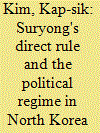| Srl | Item |
| 1 |
ID:
170115


|
|
|
|
|
| Summary/Abstract |
We aim to verify how identifications (South Korean identification and ethnic identification) directly and indirectly influence the attitude toward Korean unification through the perception of North Korea (hostile vs. cooperative). Based on national wide survey data (N = 1,000), we investigated the structural relationships among the variables using a structural equation model. The research results reveal that (1) ethnic identification and South Korean identification and cooperative perception and confrontational perception toward North Korea are distinguishable concepts respectively; (2) ethnic identification has a direct effect on positive attitude toward unification and also has an indirect effect on one's attitude through cooperative North Korea perception; and (3) South Korean identification has a direct but negative influence on positive attitude toward unification but does not have a significant influence on perception toward North Korea. The implications of the research are discussed.
|
|
|
|
|
|
|
|
|
|
|
|
|
|
|
|
| 2 |
ID:
111524


|
|
|
| 3 |
ID:
085297


|
|
|
|
|
| Publication |
2008.
|
| Summary/Abstract |
The political system in North Korea has been characterized as a "Suryong Dominant Party-State System." Since the mid-1980s, however, its political system has displayed two interesting aspects. Formally, the broad "Suryong System" has been maintained; in practice, however, the Workers' Party of Korea, the Korean People's Army, and the government have come to acquire respectively different and considerably strengthened roles. Under this new regime, Kim Jong Il Suryong directly rules over the party, the government, and the military. Meanwhile, the political-ideological base, the military base, and the economic base are administered respectively by the party, the army, and the government. Interestingly, while the power of the party still overwhelms that of the military and the government, the party's means of influence has changed from giving direct orders to providing provisions or encouraging policy outlines
|
|
|
|
|
|
|
|
|
|
|
|
|
|
|
|